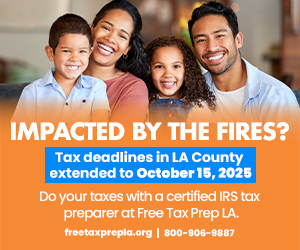Altadena Now is published daily and will host archives of Timothy Rutt's Altadena blog and his later Altadena Point sites.
Altadena Now encourages solicitation of events information, news items, announcements, photographs and videos.
Please email to: Editor@Altadena-Now.com
- James Macpherson, Editor
- Candice Merrill, Events
- Megan Hole, Lifestyles
- David Alvarado, Advertising


Wednesday, April 16, 2025
UCLA Survey: Frustration Remains High for LA County Residents
CITY NEWS SERVICE

Concerns over the high cost of living kept the satisfaction of Los Angeles County residents at its lowest-ever level for the second year running, with worries about the pervasive problem of homelessness adding to the feeling of pessimism, according to a new UCLA survey released Wednesday.
The latest edition of the UCLA Luskin School of Public Affairs’ quality of life index reveals that despite the sunshine, beaches and excellent tacos, living in Los Angeles is essentially a downer for respondents.
There was no overall change in the survey this year. However, the score of 53 matches last year’s lowest ever in the 10 years of the report’s existence. The survey has hit this low point in three out of the last four years.
The cost of living remains a primary concern as people worry about losing their homes or feeding their families. Many residents said job security and the state of the economy adds to their uneasiness.
For several years, polling has consistently shown the problem of homelessness to be at or near the top of concerns throughout Los Angeles County. This year’s survey stands out in that it exposed the possibility of a slight change in the narrative. For the first time in recent years, the number of county residents who believe the problem is getting worse actually declined by nearly 10 points — from 60% in 2024 to 52% in 2025. Only 10% of respondents believe the situation is improving.
The survey measures county residents’ satisfaction levels in nine categories. The overall rating of 53 on a scale from 10 to 100, marks the third time in four years it fell below the survey’s 55 midpoint since the index launched in 2016. That means a majority of respondents are dissatisfied with the overall quality of their lives. The highest rating of 59 was recorded in 2016 and 2017.
Deep-seated frustration with the high cost of living remains a main concern in America’s largest county, which is also confronting new challenges presented by the January 2025 wildfires, the Trump Administration’s latest round of threats to immigrants, and the glaring problem of homelessness, according to the annual survey.
In addition to the standardized questions included each year, questions were included this year that touched on the wildfires, which occurred just before the survey was implemented. The collective trauma of the January wildfires in the communities of Pacific Palisades and Altadena is more widespread than anticipated, with effects felt not just in those neighborhoods, but all across the county in areas ranging from North County to South Bay, researchers determined.
“The wildfires that raged in Altadena and Pacific Palisades in January are the story of this year’s survey,” said Zev Yaroslavsky, director of the UCLA study. “These catastrophic events have left devastating physical and psychological impacts in their wake. Although the primary victims are those who lost their lives, homes, and possessions, millions of other Angelenos have been touched by these terrifying events in myriad ways. These impacts cross geographic, economic and racial lines that can only be described as a shared trauma across Los Angeles County.”
More than two-fifths of the sample say that they know someone personally affected by the fires. While areas near and adjacent to the two major fires report the greatest connection to fire victims, even in more faraway locales such as North County or the South Bay, roughly 25% of respondents say they know someone who lost a home or a business due to the fires.
The reports shows 14% of the sample said that an actual loss of income caused by the fires “applied a great deal” to them personally, and another 13% said it applied somewhat. While the percentage who lost income is lower than that of other impacts, it still represents millions of Angelenos. The index found that the hardest hit are disproportionately Latino, younger, lower income, and more likely to work part-time jobs.
In terms of recovery and where the region goes from here, 89% of county residents believe that homeowners who lost their property to the fires should be allowed to rebuild at the same location. The same question was asked in 2019 after the Woolsey Fire, and at that time, 76% agreed with allowing for rebuilding in the same location.
Both numbers are high, but the geographic breadth of the fires, the extent of the destruction, and the collateral impacts they had on a wide swath of the county significantly influenced this year’s results, according to UCLA.
In addition, a slight majority of 52% of residents are willing to increase taxes to fund efforts to improve wildfire response. This question was asked in a broad sense without respondents being presented with specific taxes or dollar amounts. Younger residents, Latinos and Asians were most supportive of a potential tax increase, while whites and Blacks were evenly split.
Immigration and deportation issues were also of concern for many residents in this year’s report.
“The new administration in Washington has once again brought the question of immigration and deportation to the fore,” Yaroslavsky said in a statement. “A significant percentage of county residents (44%) are worried that they, a member of their family, or a friend could be deported by federal authorities, more than expressed the same concern in early 2017, at the onset of President Trump’s first administration (37%). This is very much an issue that is front and center on the minds of a large part of our county’s population.”
Latinos (54% concerned), residents ages 18-29 (57% concerned) and 30- 39 (52% concerned) are by far the likeliest to have this worry. They are also more willing to believe that city and county governments ought to refuse to cooperate with the federal government and its new policies, although views overall are somewhat split on this issue, researchers said.
The survey also examined approval ratings for local elected officials. Attitudes toward public officials including Mayor Karen Bass and the county Board of Supervisors were also affected by the fire response, which have exacted what could be a temporary political toll. In the case of Bass, 37% of survey respondents view her favorably and 49% unfavorably, while the county board is viewed favorably by 34% and unfavorably by 37%.
This year’s quality of life survey was based on interviews with 1,400 county residents over two weeks beginning on Feb. 23. The survey’s margin of error is plus or minus 3%.
Altadena Calendar of Events
For Pasadena Events, click here











